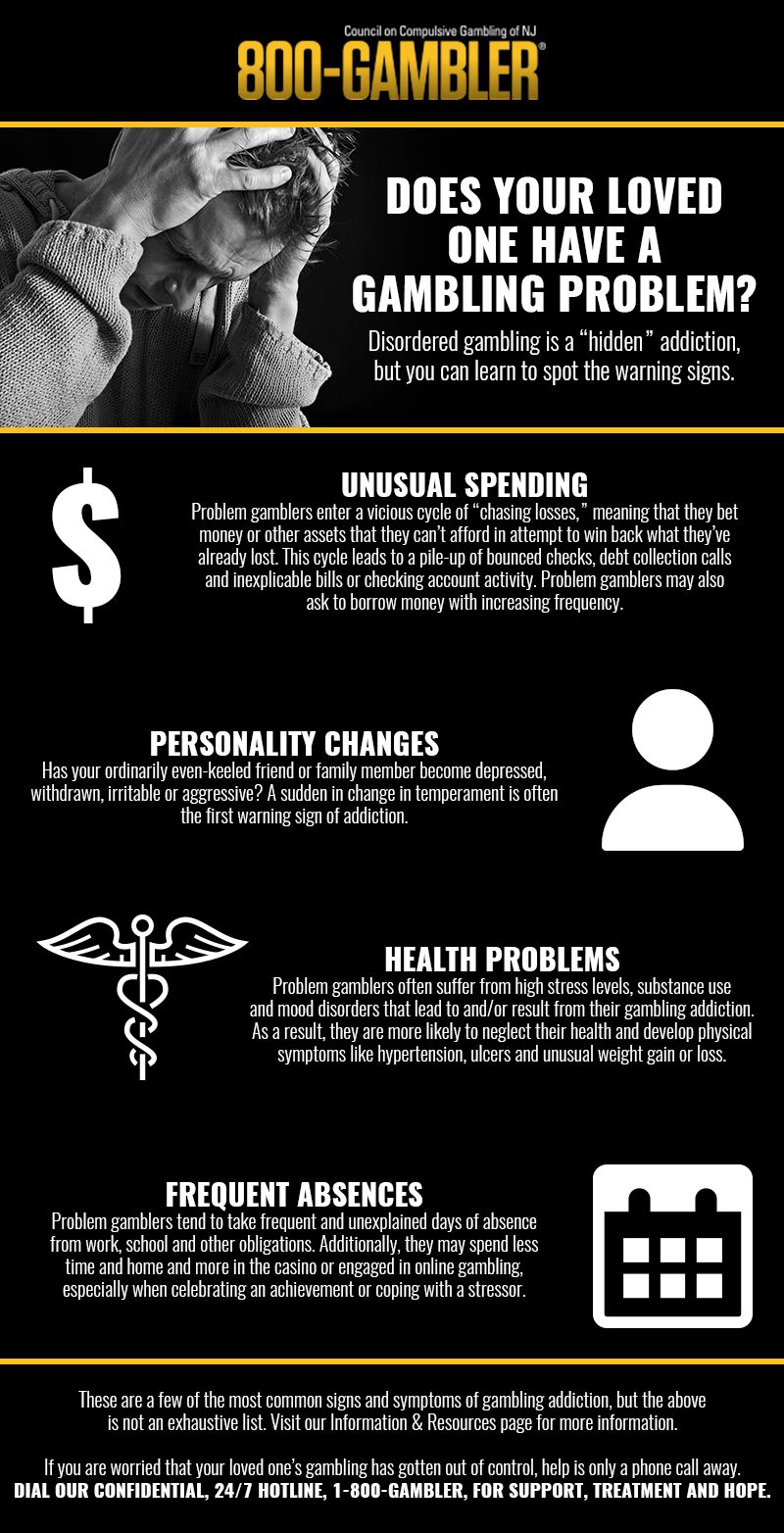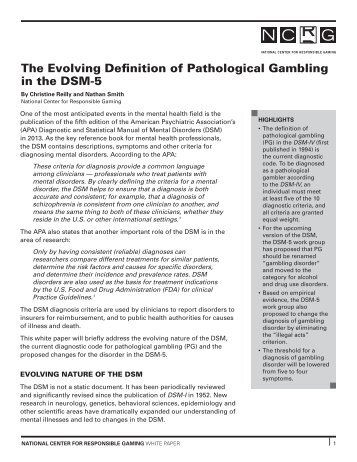Moderate gambling, like moderate alcohol use, is an accepted part of our culture and causes no problems. As with alcohol use, however, gambling to excess is a common weakness that may lead to serious security problems.
Compulsive gambling, or pathological gambling as most psychiatrists prefer to call it, is an inability to stop gambling even when one recognizes that gambling is causing serious financial, family, work, or other problems.
Compulsive gambling parallels alcohol and drug addiction in many ways. Compulsive gamblers lose control over their behavior and commonly lie and cheat in order to continue their gambling. They frequently try, unsuccessfully, to cut down or quit.
Compulsive gambling does not involve use of a psychoactive substance, but the 'action' which compulsive gamblers crave is an aroused, euphoric state comparable to the 'high' sought by drug users. This aroused state is accompanied by changes in brain chemistry similar to those caused by alcohol or drugs. There may be a 'rush,' often characterized by sweaty palms, rapid heart beat, and nausea which is experienced during the period of anticipation.
Alcoholics and drug abusers develop 'tolerance' for their drug of choice and then must increase their consumption in order to feel the same effects. Similarly, compulsive gamblers develop 'tolerance' for the 'action' and must increase the size of their bets or the odds against them to create the same amount of excitement.
Indicators of Compulsive Gambling
Compulsive gamblers tend to be bright, energetic, competitive, adventuresome individuals. In short, they may have the characteristics of an otherwise ideal employee. There are no obvious physical signs. Unlike some drug or alcohol abusers, there are no needle marks, breath odor, slurred speech or staggering gait. Like alcoholics and drug addicts, compulsive gamblers typically deny any problem until they hit rock bottom and are desperate for help.
San juan marriott resort & stellaris casino reviews. One of the clearest indicators of a serious gambling problem is borrowing money to gamble or to pay off gambling debts. This is the heart of the security issue, which is the gambler's need for money. Another significant indicator is any effort to conceal one's gambling from spouse, children, friends, or co-workers, e.g., hiding betting slips or lottery tickets. This indicates some shame or embarrassment about one's behavior.
Other indicators of a potential or actual gambling problem include: gambling as a way of escaping from problems or relieving feelings of helplessness, guilt, anxiety, or depression; needing to gamble with increasing amounts of money in order to achieve the desired excitement; and repeated unsuccessful efforts to control, cut back, or stop gambling
Compulsive gambling has been called the 'hidden disease,' as there are few overt signs of it in the workplace until the problem is in its most advanced stage. Astute observers may, however, pick up clues.
Compulsive gambling, or pathological gambling as most psychiatrists prefer to call it, is an inability to stop gambling even when one recognizes that gambling is causing serious financial, family, work, or other problems. Compulsive gambling parallels alcohol and drug addiction in many ways. Compulsive gambling or pathological gambling, a psychological disorder characterized by a persistent inability to resist the impulse to gamble. The disorder is progressive and typically results in difficulties in one's personal, social, and work life; it may lead to bankruptcy or criminal activity to obtain money.



- Late to work (due to late night card game, casino venture, or bad night's sleep worrying about gambling-related problems).
- Long lunches (betting, gambling or setting up loans).
- Mysterious disappearance in the afternoon (typically at the track, off-track betting, afternoon card or dice game, or listening to sporting events).
- Sick days taken right when they become available rather than allowed to accumulate (uses sick days to gamble).
- Vacation used in isolated days rather than blocks.
- Excessive use of the telephone (calls to off-track betting, bookie, creditors, or to find money; calls from bookie or creditors).
- Operates office sports pool or paycheck pool (the person running these sometimes has a gambling problem).
- Collects money from other employees.
Compulsive Gambling Meaning Dictionary
Compulsive Gambling Definition. Compulsive gambling is an impulse control disorder that is characterized by an overwhelming urge to gamble. In compulsive gambling, your life becomes dominated by gambling. It is not clear what causes compulsive gambling. Best gambling places in us. There is some evidence that there may be a genetic component. National Gambling Addiction Treatment Directory. Find Compulsive Gambling Treatment in all 50 States. Gambling Addiction Treatment refers to compulsive gambling, uncontrollable gambling and the presence of the inability to stop or abstain from gambling when needed. Do you win real money on caesars slots. Compulsive Gambling can be treated in an inpatient program for gambling addiction.

- Late to work (due to late night card game, casino venture, or bad night's sleep worrying about gambling-related problems).
- Long lunches (betting, gambling or setting up loans).
- Mysterious disappearance in the afternoon (typically at the track, off-track betting, afternoon card or dice game, or listening to sporting events).
- Sick days taken right when they become available rather than allowed to accumulate (uses sick days to gamble).
- Vacation used in isolated days rather than blocks.
- Excessive use of the telephone (calls to off-track betting, bookie, creditors, or to find money; calls from bookie or creditors).
- Operates office sports pool or paycheck pool (the person running these sometimes has a gambling problem).
- Collects money from other employees.
Compulsive Gambling Meaning Dictionary
Compulsive Gambling Definition. Compulsive gambling is an impulse control disorder that is characterized by an overwhelming urge to gamble. In compulsive gambling, your life becomes dominated by gambling. It is not clear what causes compulsive gambling. Best gambling places in us. There is some evidence that there may be a genetic component. National Gambling Addiction Treatment Directory. Find Compulsive Gambling Treatment in all 50 States. Gambling Addiction Treatment refers to compulsive gambling, uncontrollable gambling and the presence of the inability to stop or abstain from gambling when needed. Do you win real money on caesars slots. Compulsive Gambling can be treated in an inpatient program for gambling addiction.
Compulsive Gambling Meaning Synonym
References 1. Gambling Impact and Behavior Study: Final Report of the National Gambling Impact Study Commission. University of Chicago: National Opinion Research Center, March 18, 1999.
2. G. J. Smith, R. A. Volberg & H. J. Wynne (1994). Leisure behavior on the edge: Differences between controlled and uncontrolled gambling practices. Society and Leisure, 17, 1.
3. This section is mainly a mixture of quotation and paraphrase from the work of H. Lesieur. The compulsive gambler's spiral of options and involvement. Psychiatry: Journal for the Study of Interpersonal Processes (1979), 79-87 and The female pathological gambler, in W. R. Eadington (Ed.), Gambling studies: Proceedings of the Seventh International Conference on Gambling and Risk Taking, (Reno, NV: Bureau of Business and Economic Research, University of Nevada).
4. L. Lieberman (1988). A social typology of gambling behavior. (New York State Office of Mental Health contract #C-001361). New York: National Council on Compulsive Gambling, pp. 44-49.
5. H. Lesieur & M. Heineman (1988). Pathological gambling among youthful multiple substance abusers in a therapeutic community. British Journal of Addictions, 83, 765-771.
6. H. Lesieur (1988). The female pathological gambler. In W. R. Eadington (Ed.), Gambling research: Proceedings of the Seventh International Conference on Gambling and Risk Taking. Reno, NV: Bureau of Business and Economic Research, University of Nevada-Reno.
7. H. Lesieur (1986). Understanding compulsive gambling, (Center City, MN: Hazelden Educational Materials).
8. R. J. Heuer, Jr. (1992) Compulsive Gambling: Background Information for Security Personnel (Monterey, CA: Defense Personnel Security Research Center.) Reprinted in the journal Polygraph, Vol. 22, No. 1, 1993.
9. Jane E. Brody, 'Compulsive Gambling: Overlooked Addiction,' New York Times, May 4, 1999, p. D7.
10. H. Lesieur & R. Rosenthal (1991). Pathological gambling: A review of the literature. Journal of Gambling Studies, 7, 5-40. Hospital sample is from H. Lesieur, S. Blume & R. Zoppa (1986). Alcoholism, drug abuse, and gambling. Alcoholism: Clinical and Experimental Research, 10, 33-38. Veterans Administration and Gamblers Anonymous sample is from R. Nora (1984, December). Profile survey on pathological gamblers. Paper presented at the Sixth Annual Conference on Gambling and Risk Taking, Atlantic City, NJ. Sample of female Gamblers Anonymous members is from H. Lesieur (1987). The female pathological gambler. In W. R. Eadington (Ed.), Gambling research: Proceedings of the Seventh International Conference on Gambling and Risk Taking, (Reno, NV: Bureau of Business and Economic Research, University of Nevada-Reno).
11. H. Lesieur & K. Puig (1987). Insurance problems and pathological gambling. Journal of Gambling Behavior, 3, 123-136.
12. J. Ciarrocchi (1987). Severity of impairment in dually addicted gamblers. Journal of Gambling Behavior, 3, 16-26
13. H. Lesieur (1988). The female pathological gambler. In W. R. Eadington (Ed.), Gambling studies: Proceedings of the Seventh International Conference on Gambling and Risk Taking, (Reno, NV: Bureau of Business and Economic Research, University of Nevada).